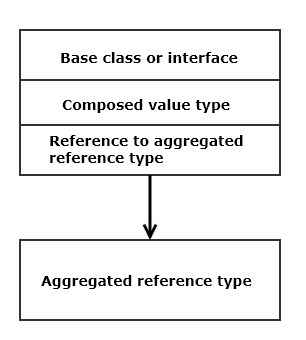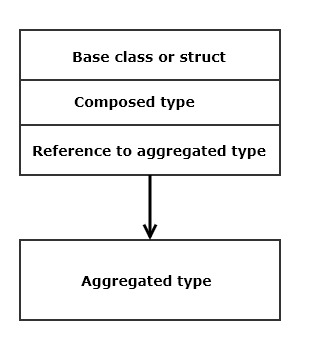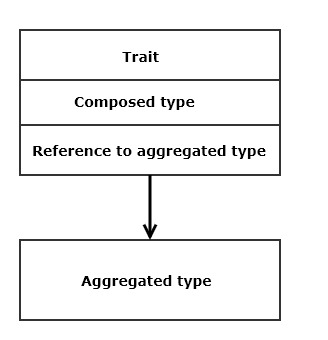- Static memory holds its contents for the entire lifetime of a program. Static memory holds compiled code and values declared as "static" which are initialized only once.
- Stack memory is allocated when a thread of execution enters a program scope and is deallocated when the thread leaves that scope. Each scope is defined by a code block enclosed by braces: '{' and '}'.
- Heap memory is allocated (from a process heap) when a program requests storage for some type and lives until the program releases that storage or the program terminates.
An instance is a typed memory location initialized with some value.
An object is an instance of a non-primitive type.
A type is a pattern for creating instances. If the type is defined by the
language we usually use the term primitive, e.g., int or double. Otherwise we just use the term type,
e.g., struct, vector. Non-primitive types are defined by standard libraries and developers.
All three of these languages support development of new types, e.g., person, order, graph, ...
a is an instance of type A we use the notation:
a ε A
-
Types:A type is defined by a memory configuration with specified set of allowed operations. Examples: integers, floating point numbers, vectors, ... An instance results from instantiating a type, i.e., declaring a name associated with the type and allocating and initializing the memory location it represents. -
Execution environment: Defines where objects are hosted, how their values are accessed, how operations on objects are processed, how errors are handled, and what information about objects are available to programs. -
Scope: Program scopes are defined by code blocks enclosed in braces, e.g., '{' and '}'. They come in two flavors: compile-time only and run-time scopes.Compile time scopes define names and access priviledges for namespaces, structs, classes, and enums. They affect what program statements are allowed to compile, but have no run-time affects.Run-time scopes are defined by functions, methods, lambdas, and control statements. They have both compile-time and run-time affects. Whenever a thread of program execution enters a scope, a new allocation of stack memory, called a stack-frame, is acquired to store local variables and calling parameters for methods, functions and lambdas. When the thread of execution leaves that scope the memory is returned to its process for reuse. -
Object layout: Primitive types, defined by the language, occupy a contiguous block of memory and may be copied and assigned. A copy or assignment results in two named memory locations each with the same value immediately following the operation, subject to cache flushing.Objects are instances of types defined by the language libraries and by developers. They often occupy two or more disjoint regions of memory, linked internally by addresses, usually with a control block in static memory, and data stored in a process heap. Assignment and copy operations on these objects have semantics defined differently by each of the languages we consider here. -
Object relationships: Figure 1. Object Relationships There are four relationships between objects for all three languages. C++ offers an infrequently used fifth relationship: -
Inheritence:
Base types declare methods and associated functions. They may, but often don't, supply implementations. Base methods may be declared virtual. That causes compilation to layout a virtual function pointer table used for dispatching methods dynamically, i.e., decide at run-time which derived class override to invoke.Derived classes inherit from a base and are obligated to supply implementations for every undefined method declared in the base. A base class becomes part of the memory footprint of every class that derives from that base. -
Composition:
Include in the composing class instance an instance of a composed class. This supports factoring complex operations into sets of simpler parts.The composed instance becomes part of the memory footprint of the composing class; and is constructed as part of the composer construction. -
Aggregation:
Include in the aggregating class a reference to an aggregated class. The aggregated class instance is created, at run-time, by one of the aggregating class methods.An aggregated class instance does not become part of the footprint of the aggregating class, and is not inherently created as part of the aggregating class construction. -
Using:
A reference to a used class is passed as an argument in a using class method. The used class is not created by the user and is not part of the using class footprint. -
Friendship:
The C++ language allows a class to grant friendship to a non-class function, or to another class. Friendship allows the friend access to private data of the granting class. This is primarily used to support overloading insertion and extraction operators that are used for, but are not part of the granting class.
-
Inheritence:
-
Instance management: Managing instances consists of: -
Binding
Binding associates a name with a newly created typed memory location.let dst:D = D::new() // Rust
D dst // C++
D dst = new D() // C# -
Assignment
The destination of an assignment aquires the same state as the source.dst = src -
access
The ability of one instance to read contents of another instance. Rules for access are determined by ownership policies, class declarations, and location. The rules differ significantly for the three languages (see below). -
mutation
The ability to modify contents of an accessible instance. Mutation rules are determined by ownership policy, binding syntax, and class declaration. -
destruction
Return resources attached to an instance to the program's process. Rules for destruction are determined by the execution environment. C# uses garbage collection; C++ and Rust use scope-based deallocation.
-
Binding
-
Operations: Operations are operators, functions, methods, and lambdas. The biggest differences for the three languages are which operations can be overloaded. -
operators
Operators are functions that have an alternate symbolic representation, e.g.,+ ,- ,= , ... -
functions
Functions are named code blocks that accept zero or more parameters and may return a value of some type. -
methods
Methods are functions that are bound to a class and have access to the class's member data. -
associated methods
Associated methods are bound to a class, but do not have access to its member data. -
lambdas
Lambdas are anonymous types that can be defined locally within functions and methods. They compile to class instances with a function that contains the lambda code block and member data that is captured from the scope in which the lambda was defined.
-
operators
3. Object Model Details:
bool, int, char, double, enum, struct, ..
Reference types:
string, class, interface, array, delegate, ..
Collections are reference types:
ArrayList, Hashtable, Stack, Queue, Dictionary, SortedList, ..
bool, int, unsigned int, char, wchar_t, float, double, ..
Aggregate types:
array, struct, class, enum
Collections:
vector, deque, set, map, unordered_set, unordered_map, ..
bool u8, i8, .. u64, i64, f32, f64
Aggregate types:
array, struct, enum
Collections:
Vec, VecDec, HashSet, HashMap, ..
Reference types only. Base class embedded within memory footprint of derived.
composition:
Only value types, embedded in composer.
aggregateon:
Reference type created at run-time and stored seperately.
using:
Non-owning, given access to used object as reference argument of users member function.
Structs and classes only. Base class embedded within memory footprint of derived.
composition:
All types, embedded in composer.
aggregateon:
All types, created at run-time and stored seperately.
using:
Non-owning, given access to used object as reference argument of users member function.
Structs may inherit only Traits (similar to an interface). Traits are usually function declarations without implementation.
composition:
All types, embedded in composer.
aggregateon:
All types, created at run-time and stored seperately.
using:
Non-owning, given access to used object as reference argument of users member function.


